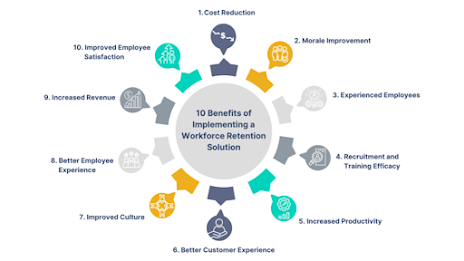Why Employee Retention is Important
 |
| Figure 1:work; source: (Vonnegut., 2009) |
Employee retention refers to an
employee's decision to stay with their current employer rather than seek out
other employment. A company's turnover rate is the rate at which its employees
leave for whatever reason. In the simplest terms, retention is an
organization's strategy for preventing employee turnover. Retention rates,
defined as the percentage of an organization's workforce that remains with the
company after some period of time, are highly variable among industries and
companies (BasuMallick , 2020).
Why employee retention matters to HR?
A complete human resource management
strategy involves a plan to retain people your company recruited, onboarded,
and trained. Business sense: Replacing an employee might cost half to double
their annual income. Soft costs include company culture, employee satisfaction,
and more. Companies that neglect staff retention pay dearly. Investing in staff
retention and turnover risks pays off. They report greater sales, productivity,
and morale. HR management systems efficiently handle employee retention
strategies and data (HRMS). HR software assists with applicant management, onboarding,
and employee engagement. The tools let you understand your turnover rate and
follow the progress of any fixes ( Holliday, 2021).
Benefits of employee retention
Retaining employees involves more than just reducing the
negative effects of turnover. As an added bonus, it provides avenues for
enhancing the company's performance across a variety of important indices. Here
are seven ways in which businesses may profit from developing and implementing
staff retention strategies and practices ( Holliday, 2021).
What ultimately determines whether or not a business is
successful in retaining its best employees is the policies and practices it
puts in place to foster an environment where employees want to stay. According
to (paulsen,2021) Below are some of the advantages of retaining
employees,
1.Reduced expenses
2. Improved morale.
3. increased efficiency
4.Increased customer satisfaction
5.Less time spent recruiting and training employees
6. Improved company culture.
7. Higher employee involvement.
8.Enhanced revenue and ROI
9. More employee expertise.
 |
| Figure 2: Benefits; Source : (Finn, 2021) |
Strategies to improve employee retention
2. Optimize the onboarding experience.
3. Create a culture of recognition and feedback.
4. Develop your employees.
5. Act on insights from exit surveys.
Conclusion
Ghosh , P. (2021) What Is HRIS? System, Model, and
Application |, What Is HRIS? System, Model, and Application | Spiceworks
1. Available at:
https://www.spiceworks.com/hr/performance-management/articles/what-is-hris/
(Accessed: December 4, 2022).
Ankrah, E. and Sokro, E. (2012) “HUMAN RESOURCE
INFORMATION SYSTEM AS A STRATEGIC TOOL IN HUMAN RESOURCE MANAGEMENT,” Problems
of Management in the 21st Century, 5, pp. 6–7. doi: 10.33225/pmc/12.05.06.
Yasar, K. (2022) What is an HRIS (Human Resource
Information System)?, HR Software. Available at:
https://www.techtarget.com/searchhrsoftware/definition/HRIS (Accessed: December
4, 2022).
Mankin,
Nicole (2022) What is the role
of HRIS software in the strategic HRM? | Firmbee, Firmbee. Available
at: https://firmbee.com/strategic-hrm (Accessed: December 4, 2022).
Hirsch, S. (2022) The 10 Best Human Resource
Management Systems in 2022, Connecteam. Available at:
https://connecteam.com/best-human-resource-management-systems/ (Accessed:
December 4, 2022).
Paulsen, E. (2021) Why Employee Retention is
Important, Why Employee Retention is Important. Available at:
https://www.quantumworkplace.com/future-of-work/why-employee-retention-is-important
(Accessed: December 5, 2022).


They encourage higher levels of engagement and productivity, which ultimately leads to a rise in income. They also encourage employees to stay with your business. Any retention strategy's primary objective is to reduce turnover as much as feasible.
ReplyDeleteGood Article.in addition to that Other factors like emotional safety, team bonding, and mental wellness have equal weight in the employee retention , in addition to factors like salary, bonuses, and work-life balance.
ReplyDelete